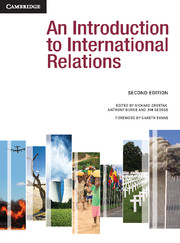Book contents
- Frontmatter
- Contents
- Tables, Figures and Boxes
- Contributors
- Preface and acknowledgements
- An Introduction to International Relations: The origins and changing agendas of a discipline
- 1 Theories of International Relations
- 2 The Traditional Agenda
- 9 The Modern State
- 10 Nations and Nationalism
- 11 Security
- 12 Arms Control
- 13 The Causes of War
- 14 The Changing Character of Warfare
- 15 The Ethics and Laws of War
- 16 International Law
- 17 International Society and European Expansion
- 18 Diplomacy
- 19 Great Powers
- 20 The Cold War
- 3 The New Agenda
- Glossary of Terms
- Bibliography
- Index
- References
10 - Nations and Nationalism
from 2 - The Traditional Agenda
- Frontmatter
- Contents
- Tables, Figures and Boxes
- Contributors
- Preface and acknowledgements
- An Introduction to International Relations: The origins and changing agendas of a discipline
- 1 Theories of International Relations
- 2 The Traditional Agenda
- 9 The Modern State
- 10 Nations and Nationalism
- 11 Security
- 12 Arms Control
- 13 The Causes of War
- 14 The Changing Character of Warfare
- 15 The Ethics and Laws of War
- 16 International Law
- 17 International Society and European Expansion
- 18 Diplomacy
- 19 Great Powers
- 20 The Cold War
- 3 The New Agenda
- Glossary of Terms
- Bibliography
- Index
- References
Summary
Introduction
In this chapter we will see that understanding the meaning and political importance of nations and nationalism in world politics is a challenging task. One recent survey of concepts in International Relations (IR) said of the term ‘national interest’ that it was ‘the most vague and therefore easily used and abused’; of nationalism it said that ‘there is a lack of consensus about what it is and why it has maintained such a firm hold over so much of the world’s population’; and that ‘Nations and states seem identical but they are not’ (Griffiths and O’Callaghan 2002: 202–13). The following discussion will survey debates on nation and nationalism around three broad questions. The first concerns debates around terminology and their contemporary relevance for the study of IR. The second relates to questions of nation formation and the origins of nationalism, particularly in terms of how it came to shape modern states and international society. The third illustrates how the ideas of nations and nationalism have been important in IR theory and practice.
The focus here will be on how interdisciplinary debates on nationalism have informed our understanding of this complex issue in IR. As a discipline, the field itself has made a surprisingly modest contribution to this scholarship (see Carr 1945; Hinsley 1973; and Mayall 1990). Nationalism is often not addressed explicitly but it has a significant tacit presence in all of the major schools of thought in the discipline. However, mainstream IR theories have compounded some of the analytical problems associated with understanding nationalism. For example, classical realists have tended to conflate nation and state into the concept of ‘national interest’, while liberal and Marxist theorists have been internally conflicted over the merits of nationalism versus its potential to undermine ideals of internationalism. The study of nationalism should be a central consideration for any analysis of the major issues in contemporary global politics because taking questions of national interest, values and identity seriously is one way of invoking the idea that culture and ‘people’ matter.
- Type
- Chapter
- Information
- An Introduction to International Relations , pp. 148 - 159Publisher: Cambridge University PressPrint publication year: 2011



